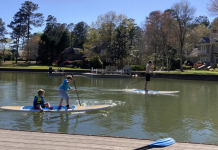 As moms, we are constantly planning for the unexpected. Always having a First-Aid Kit on hand has put my mind at ease, and has been useful more times than I can count. While I have found that most childhood injuries can be healed with a Band-Aid and a quick kiss, here are some other items I keep in my First Aid Kit. I always keep this in my car or diaper bag, so it can be quickly accessed when needed.
As moms, we are constantly planning for the unexpected. Always having a First-Aid Kit on hand has put my mind at ease, and has been useful more times than I can count. While I have found that most childhood injuries can be healed with a Band-Aid and a quick kiss, here are some other items I keep in my First Aid Kit. I always keep this in my car or diaper bag, so it can be quickly accessed when needed.
Checklist
- Break and shake ice packs (I learned the hard way at the ballfield that many concession stands do not have ice)
- Band-Aids
- Compress dressing
- Sterile Gauze
- Antibiotic ointment
- Hydrocortisone ointment
- Antiseptic wipes
- Emergency blanket
- Breathing barrier with 1-way valve for CPR
- Non-latex gloves
- Tweezers
- Tourniquet
- Benadryl (oral and topical)
- Stinger remover
- Naloxone
Customize
Customize your First-Aid Kit to meet the individual needs of your family. For example, you may need to keep an Epi pen for anaphylactic reactions, a rescue inhaler for asthma, or Glucagon and Insulin for a diabetic. Make sure that you familiarize yourself with how to use items in your First-Aid Kit before an emergency occurs. Replace any supplies before they expire. Set a calendar reminder on your phone to update or replace the supplies in your kit every six months.
Life Saving Skills
I highly recommended taking a Basic Life Support class, to learn life saving skills such as CPR and the Heimlich maneuver. Personally, I have witnessed multiple seizures in public (more than I have seen inside the hospital as a nurse!) and it is vital to stay calm and offer assistance when you can. CPR training, You are the Help Until Help Arrives, and Stop the Bleed are good resources to start with.
Alabama Department of Public Health recently began offering fast and easy online training to administer Naloxone (Narcan) in cases of Opioid overdose, and will send you free Naloxone at the conclusion of the course. I always keep one in my First-Aid kit.
Confidence is Key
As a RN working with new moms, I often hear parents say they are afraid an emergency will happen when they are alone with their child. This is valid concern, so educating yourself on emergency preparedness and how to administer first aid will give you the confidence to overcome those situations.
Take a deep breath, remember what you have learned, and do your best as you offer support to those in need.











